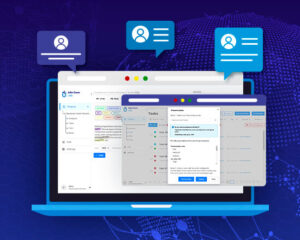We are thrilled to announce the release of NLP Lab 4.10, which comes with an array of exciting new features aimed at enhancing user experience and improving the efficiency of the platform. Among the notable additions is the ability to get a trial license from within the tool, enabling users to explore the full potential of NLP Lab and the seamless automatic import of the trial license into the platform.
Additionally, users can now conveniently add comments to their tasks on the Labeling Page, fostering a more collaborative and structured setting for annotation activities. Another valuable feature introduced in this release is the ability to add tags directly from the Labeling Screen, allowing for better categorization and management of labeled tasks. Lastly, the new version includes a more powerful range of filters allowing users to better specify what tasks they need to export.
Here are the highlights of this release:
In-App Trial License Generation
Version 4.10 offers an updated License page layout that streamlines the process of obtaining a trial license. This updated design enables users to initiate a trial license request directly from the License page, thereby eliminating the need for external page navigation. This enhanced workflow incorporates a new “Get License” tab, while maintaining the status quo of the Import License and Existing Licenses tabs.
To obtain a trial license, users are required to fill out the form on the “Get License” tab, providing their organizational email. Once the form is submitted, a validation link is sent to the provided email address, and the trial license is automatically imported to the NLP Labs when the link is clicked, making it readily available for use.

Comments on the Labeling Page
NLP Lab 4.10 introduces an enhanced comment feature for labeling pages, enabling users to easily add, update, and delete comments for their tasks. This feature significantly improves work efficiency and productivity and enhances communication between team members, leading to faster delivery and more effective collaboration. To access this feature, users can find the New Burger menu located at the top right of the labeling page. The burger menu contains an option for Comments, which displays the comments created so far for the current task. By clicking this option, a new pop-up window will appear, providing access to various commenting features.

Tags definition on the Labeling Screen
NLP Lab 4.10 introduces an enhanced tags feature for tasks, that can now be specified from the Labeling page. This feature provides users with a convenient way to create, add, and remove tags from tasks directly on the Labeling page. It significantly contributes to better organization and enhanced productivity streamlining task management by offering users increased flexibility in categorizing and tracking their labeled data. Similar to the comment feature described above, the tag feature can be accessed through the burger menu located at the top right corner. The burger menu displays the total number of tags associated with its functions. By clicking the burger menu option, a new popup window appears, allowing users to add existing tags or create new ones.

Filters for exporting tasks
NLP Lab 4.10 also allows selective annotation exports. Users can now choose which annotations to export by using two new filters on the export page. These new filters can be combined with other filter options like Tags, Only ground truth, and Exclude tasks without Completions.
- Filter Exported Annotations by Task: this filter allows users to select annotations based on the task (NER, Classification, Assertion, Relation Extraction)
- Select Annotations to Include In the Export: this filter can be used to select available labels, classes, assertion labels, or relations.

Improvements
Add Video template to the project content type
The current release re-introduces the Video content type to the project configuration page. This provides users with a flexible way to annotate projects that are based on video content.

The image path property in the export JSON for Visual NER task is of type list
The discrepancy concerning the image property value format in the exported JSON has been resolved in this current version. In previous versions, the image property held a string value when there was a single image task, whereas it held a list type value for multiple images. To maintain consistency, the image property will now invariably retain a list type value, regardless of the number of image tasks.
Remove irrelevant items in the “Tasks by Status” chart
In the previous versions, the “Tasks by status” chart displayed redundant values (0.00%) when there are no tasks for the specific status category. In the current release, these irrelevant values were removed from the “Tasks by status” chart on the analytics page.

Improved Tasks and Project filters
Filtering tasks based on tags, inside the task view’s tag filter, has been updated to allow users to select multiple tags from the Tags dropdown. This allows the filtering of the tasks based on various criteria. In our previous versions, the users were limited to selecting only one tag at a time, making the filtering mechanism restrictive when attempting to narrow down tasks based on multiple tags simultaneously. The new functionality increases productivity by allowing users to apply multiple filter criteria for retrieving the desired list of tasks, matching at least one of the selected tags.

Additionally, the same improved filter behavior can be found on the project page too. This provides users with increased flexibility and efficiency in filtering tasks or projects based on multiple criteria.
For a complete list of enhancements and bug fixes included in this release please check the official release page.
Getting Started is Easy
The NLP Lab is a free text annotation tool that can be deployed in a couple of clicks on the AWS and Azure Marketplaces, or installed on-premise with a one-line Kubernetes script. Get started here: https://nlp.johnsnowlabs.com/docs/en/alab/install





























